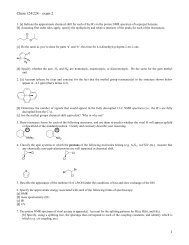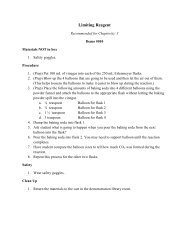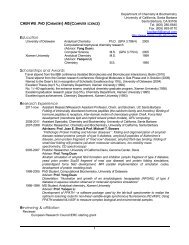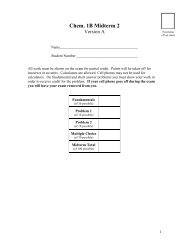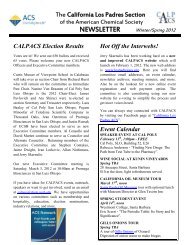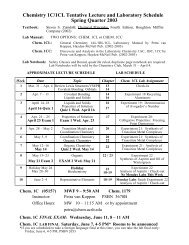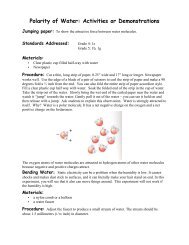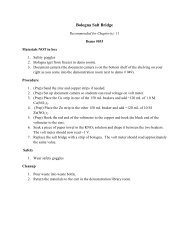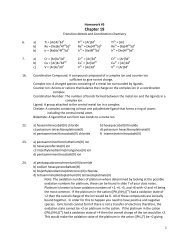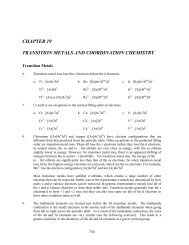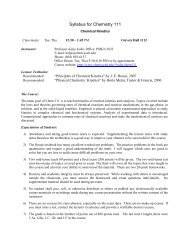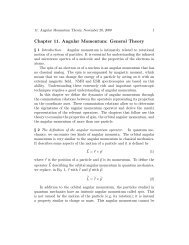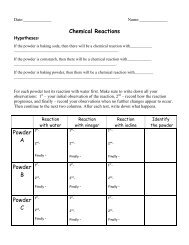Syllabus for Drug Design Chem 162 - Department of Chemistry and ...
Syllabus for Drug Design Chem 162 - Department of Chemistry and ...
Syllabus for Drug Design Chem 162 - Department of Chemistry and ...
Create successful ePaper yourself
Turn your PDF publications into a flip-book with our unique Google optimized e-Paper software.
Course syllabus <strong>for</strong> <strong>Chem</strong>istry <strong>162</strong>/262<br />
<strong>Drug</strong> <strong>Design</strong> (Fall 2005)<br />
Class meets: Mon, Wed, Fri 12:00 – 12:50 AM Phelps 1440<br />
Instructor: Pr<strong>of</strong>essor Kalju Kahn, Office: PSB-N 1511<br />
E-mail: kalju@chem.ucsb.edu Phone: (805) 893-6157<br />
Office Hours: Tue 11:00-12:00 <strong>and</strong> Thu 11:00-12:00 or by appointment<br />
Course website: http://www.chem.ucsb.edu/~kalju/chem<strong>162</strong><br />
Lecture Textbook:<br />
Richard B. Silverman,<br />
The Organic <strong>Chem</strong>istry <strong>of</strong> <strong>Drug</strong> <strong>Design</strong> <strong>and</strong> <strong>Drug</strong> Action, 2 nd edition (2004)<br />
The Course: In <strong>Chem</strong> <strong>162</strong> students learn principles that govern the process <strong>of</strong> modern drug discovery <strong>and</strong><br />
development. Students will follow a path similar to that taken by real-life drug developers by learning important<br />
elements <strong>of</strong> the drug design process in a logical order. Some topics that we focus more extensively are:<br />
‣ Biochemistry <strong>and</strong> molecular biology <strong>of</strong> diseases<br />
‣ Enzyme mechanisms <strong>and</strong> inhibition<br />
‣ Target validation methodologies<br />
‣ Structure-base drug design<br />
Expectations <strong>of</strong> Students:<br />
‣ Attendance <strong>and</strong> taking good lecture notes is expected. Submitting completed assignments in time is required.<br />
‣ The textbook provides some necessary background material. Furthermore, students are expected to read modern<br />
drug design-related research literature. Required literature will be available on the course website.<br />
‣ Honesty <strong>and</strong> academic integrity must be always preserved. While discussing your ideas with others is<br />
encouraged outside the classroom, you must answer the assignment questions individually. No supplemental<br />
material should be used during an exam.<br />
‣ Your grade in the course is based on points you collect from the weekly assignments (10 points each), a mid-term<br />
(40 points), final (50 points) <strong>and</strong> the draft <strong>of</strong> a research proposal (50 points). Grading will be based on the curve<br />
but you have to meet a certain level to get a grade higher than F.<br />
‣ The course requires that you have a solid underst<strong>and</strong>ing <strong>of</strong> basic biology <strong>and</strong> organic chemistry; good<br />
background in biochemistry <strong>and</strong> physical chemistry will be very helpful.<br />
‣ No student shall give, sell, or otherwise distribute to others or publish any electronically available course<br />
materials or recordings made during any course presentation without the written consent <strong>of</strong> the instructor.<br />
Study tips:<br />
‣ I am posting lecture note slides on-line be<strong>for</strong>e the class meets so that you can focus on following my talk. The<br />
slides are mainly illustrative <strong>and</strong> you need to follow the lecture in order to fully underst<strong>and</strong> the topics I cover.<br />
‣ Come in class prepared. Read the relevant textbook material <strong>and</strong> required reading be<strong>for</strong>e the class meets. I like<br />
to interact with students during our meetings <strong>and</strong> you enjoy the lectures more if you can think along.<br />
‣ Review (or rewrite) your class notes the same day <strong>and</strong> supplement them with material from the textbook <strong>and</strong><br />
other resources (optional reading, Internet). Ask <strong>for</strong> help if something remains unclear.<br />
‣ This course is not about memorization <strong>of</strong> names, reactions, or facts. It is about underst<strong>and</strong>ing the process, its<br />
principles <strong>and</strong> methods. You should demonstrate good underst<strong>and</strong>ing <strong>of</strong> the material when answering<br />
assignment questions <strong>and</strong> the exam problems. Your creativity <strong>and</strong> originality are highly important <strong>for</strong> getting a<br />
high score in the final written proposal.<br />
Good luck! — Kalju
<strong>Chem</strong><strong>162</strong>/262 Schedule <strong>for</strong> the Fall 2005<br />
Sep 23 rd W Overview <strong>of</strong> the course.<br />
Sep 26 th M History <strong>of</strong> drug design<br />
Sep 28 th W Current approaches <strong>and</strong> philosophies in drug design.<br />
Sep 30 th F Discussion <strong>of</strong> the “<strong>Drug</strong> <strong>Design</strong> Project” w/ Dr. Reich<br />
Oct 3 rd M Molecular mechanisms <strong>of</strong> diseases <strong>and</strong> drug action: examples<br />
Oct 5 th W Target Validation: Principles; HIV gp41 example First assignment due<br />
Oct 7 th F Target Validation: Traditional technologies<br />
Oct 10 th M Target Validation: High-throughput technologies<br />
Oct 12 th W Enzymes as drug targets Second assignment due<br />
Oct 14 th F Receptors as drug targets<br />
Oct 17 th M Pharmacokinetics: Principles<br />
Oct 19 th W Pharmacokinetics: Models <strong>and</strong> Applications Third assignment due<br />
Oct 21 st F <strong>Drug</strong> design s<strong>of</strong>tware in the SGI lab: Tutorial<br />
Oct 24 th M First midterm<br />
Oct 26 th W Enzyme mechanisms<br />
Oct 28 th F Enzyme kinetics <strong>and</strong> inhibition. Reversible inhibitors, TSA<br />
Oct 31 st M Irreversible inhibitors. Mechanism-based inactivators<br />
Nov 2 nd W Examples <strong>of</strong> drug design via enzyme inhibition Fourth assignment due<br />
Nov 4 th F <strong>Drug</strong>–receptor interactions. Pharmacodynamics<br />
Nov 7 th M Experimental characterization <strong>of</strong> membrane-bound receptors<br />
Nov 9 th W Biochemical <strong>and</strong> cell-based assays, lead identification.<br />
Nov 11 th F Observing Veterans Day<br />
Nov 14 th M Biomolecular interactions <strong>and</strong> binding thermodynamics<br />
Nov 16 th W Structure-based drug design: Principles. Fifth assignment due<br />
Nov 18 th F Structure-based drug design: Molecular visualization<br />
Nov 21 st M Structure-based drug design: Docking<br />
Nov 23 rd W Structure-based drug design: Binding energy calculations Sixth assignment due<br />
Nov 25 th F Thanksgiving Holiday<br />
Nov 28 th M Computer laboratory: Docking<br />
Nov 30 th W Computer laboratory: Binding energy calculations<br />
Dec 1 st F Written draft proposals due<br />
Dec <br />
Final exam<br />
Assignments<br />
(will be posted on Wednesday one week be<strong>for</strong>e the due date)<br />
1. Molecular mechanisms <strong>of</strong> disease<br />
2. Target validation exercise<br />
3. Target validation techniques<br />
4. Enzyme mechanisms, kinetics, <strong>and</strong> inhibition<br />
5. Biomolecular interactions <strong>and</strong> assay development<br />
6. Structure-based drug design




